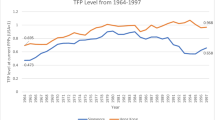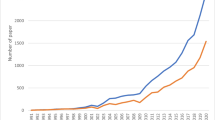Abstract
Technological progress (TP) and industrial structure optimization (ISO) have a significant impact on manufacturing carbon emissions (M_CO2) and exhibit noticeable interaction effects. However, few studies have explored the impact of the interaction between TP and ISO or incorporated this interaction in a unified theoretical framework. This study aims to empirically analyze the specific mechanism behind how the interaction between TP and ISO affects M_CO2 and examine the degree of such impact. The study adopts a novel perspective toward the interaction between TP and ISO, employing a spatial panel model for empirical analysis. Results indicate that first, technological progress has no discernible inhibitory effect on M_CO2 in both cases with or without interaction. Nevertheless, industrial structure optimization can effectively reduce M_CO2, with manufacturing structure upgrading exhibiting a more significant inhibition effect than rationalization. Second, technological change alone or its interaction with industrial structure optimization does not lead to apparent reductions in carbon emissions. However, when combined with industrial structure upgrading, technological change exhibits an important inhibitory effect on M_CO2. Thirdly, within both cases of interaction and non-interaction scenarios, manufacturing structure upgrading has a significant spillover effect on M_CO2 while technological progress and manufacturing structure rationalization do not show noticeable spillover effects. Based on these empirical findings, this paper proposes policy recommendations for reducing M_CO2 including promoting upgrades in the manufacturing industry’s structural composition, facilitating integration between technological progress and structural upgrading within the industry sector as well as strengthening inter-regional industrial connections. Addressing these challenges and implementing these policy measures will contribute to mitigating manufacturing carbon emissions and advancing sustainable industrial development.



Similar content being viewed by others
Data availability
The data used in this research are available upon request from the corresponding authors.
Abbreviations
- TP:
-
Technological progress
- TECH:
-
Technological change
- EFFCH:
-
Efficiency change
- ISO:
-
Industrial structure optimization
- ISU:
-
Industrial structure upgrading
- ISR:
-
Industrial structure rationalization
- M_CO2 :
-
Manufacturing carbon emissions
- UL:
-
Urbanization level
- FDI:
-
Foreign direct investment
- ES:
-
Energy utilization structure
- Y:
-
Manufacturing output
- SLM:
-
Spatial lag model
- SEM:
-
Spatial error model
- SDM:
-
Spatial Durbin model
- DEA:
-
Data envelopment analysis
References
Ahmed, V., & Zeshan, M. (2015). Decomposing Change in Energy Consumption of the Agricultural Sector in Pakistan. Agrarian South: Journal of Political Economy: A Triannual Journal of Agrarian South Network and CARES, 3(3), 369–402. https://doi.org/10.1177/2277976014560944
Anselin, L., Gallo, J. L., & Jayet, H. (2008). Spatial Panel Econometrics. In L. Mátyás & P. Sevestre (Eds.), The econometrics of panel data: Fundamentals and recent developments in theory and practice. Springer. https://doi.org/10.1007/978-3-540-75892-1_19
Barnhart, S. W., & Miller, E. M. (1990). Problems in the estimation of equations containing perpetual inventory measured capital. Journal of Macroeconomics, 12(4), 637–651.
Brookes, L. G., & Grubb, M. (1992). Energy efficiency and economic fallacies: A reply; and reply. Utilities Policy, 20(5), 390–393.
Chen, J., Gao, M., Mangla, S. K., Song, M., & Wen, J. (2020). Effects of technological changes on China’s carbon emissions. Technological Forecasting and Social Change, 153, 119938. https://doi.org/10.1016/j.techfore.2020.119938
Chen, J., Song, X., & You, J. (2022). Structural paths of changes in CO2 emissions in the Chinese construction industry. Journal of Environmental Planning and Management, 66, 1108–1126. https://doi.org/10.1080/09640568.2021.2016381
Cheng, Z., Li, L., & Liu, J. (2018). Industrial structure, technical progress and carbon intensity in China’s provinces. Renewable and Sustainable Energy Reviews, 81, 2935–2946. https://doi.org/10.1016/j.rser.2017.06.103
Dong, B., Xu, Y., & Fan, X. (2020). How to achieve a win-win situation between economic growth and carbon emission reduction: Empirical evidence from the perspective of industrial structure upgrading. Environmental Science and Pollution Research, 27(35), 43829–43844. https://doi.org/10.1007/s11356-020-09883-x
Fare, R., Grosskopf, S., & Pasurkajr, C. (2007). Environmental production functions and environmental directional distance functions. Energy, 32(7), 1055–1066. https://doi.org/10.1016/j.energy.2006.09.005
Grossman, G. M., & Krueger, A. B. (1995). Economic growth and the environment. The Quarterly Journal of Economics, 110(2), 353–377.
Hang, Y., Wang, Q., Zhou, D., & Zhang, L. (2019). Factors influencing the progress in decoupling economic growth from carbon dioxide emissions in China’s manufacturing industry. Resources, Conservation and Recycling, 146, 77–88. https://doi.org/10.1016/j.resconrec.2019.03.034
Hong, J., Huang, H., & Wang, X. (2023). The effect of economic structural transformation on carbon emission reduction. Resources Science, 45(11), 2103–2116. https://doi.org/10.18402/resci.2023.11.01
Huang, J., Chen, X., Yu, K., & Cai, X. (2020). Effect of technological progress on carbon emissions: New evidence from a decomposition and spatiotemporal perspective in China. Journal of Environmental Management, 274, 110953. https://doi.org/10.1016/j.jenvman.2020.110953
Kuang, B., Lu, X., Zhou, M., & Chen, D. (2020). Provincial cultivated land use efficiency in China: Empirical analysis based on the SBM-DEA model with carbon emissions considered. Technological Forecasting and Social Change, 151, 119874. https://doi.org/10.1016/j.techfore.2019.119874
Lan, F., Sun, L., & Pu, W. (2021). Research on the influence of manufacturing agglomeration modes on regional carbon emission and spatial effect in China. Economic Modelling, 96, 346–352. https://doi.org/10.1016/j.econmod.2020.03.016
Leitão, J., Ferreira, J., & Santibanez-González, E. (2022). New insights into decoupling economic growth, technological progress and carbon dioxide emissions: Evidence from 40 countries. Technological Forecasting and Social Change, 174, 121250. https://doi.org/10.1016/j.techfore.2021.121250
LeSage, J., & Pace, R. K. (2009). Introduction to spatial econometrics. Chapman and Hall/CRC. https://doi.org/10.1201/9781420064254
Li, K., & Lin, B. (2018). How to promote energy efficiency through technological progress in China? Energy, 143, 812–821. https://doi.org/10.1016/j.energy.2017.11.047
Li, L., Hong, X., & Peng, K. (2019a). A spatial panel analysis of carbon emissions, economic growth and high-technology industry in China. Structural Change and Economic Dynamics, 49, 83–92. https://doi.org/10.1016/j.strueco.2018.09.010
Li, S., & Lv, Z. (2021). Do spatial spillovers matter? Estimating the impact of tourism development on CO(2) emissions. Environmental Science and Pollution Research, 28, 32777–32794. https://doi.org/10.1007/s11356-021-12988-6
Li, Z., Shao, S., Shi, X., Sun, Y., & Zhang, X. (2019b). Structural transformation of manufacturing, natural resource dependence, and carbon emissions reduction: Evidence of a threshold effect from China. Journal of Cleaner Production, 206, 920–927. https://doi.org/10.1016/j.jclepro.2018.09.241
Lin, B., & Benjamin, N. I. (2017). Influencing factors on carbon emissions in China transport industry. A new evidence from quantile regression analysis. Journal of Cleaner Production, 150, 175–187. https://doi.org/10.1016/j.jclepro.2017.02.171
Lin, B., & Chen, G. (2018). Energy efficiency and conservation in China’s manufacturing industry. Journal of Cleaner Production, 174, 492–501. https://doi.org/10.1016/j.jclepro.2017.10.286
Lin, B., & Chen, Y. (2020). Will land transport infrastructure affect the energy and carbon dioxide emissions performance of China’s manufacturing industry? Applied Energy, 260, 114266. https://doi.org/10.1016/j.apenergy.2019.114266
Lin, B., Chen, Y., & Zhang, G. (2017). Technological progress and rebound effect in China’s nonferrous metals industry: An empirical study. Energy Policy, 109, 520–529. https://doi.org/10.1016/j.enpol.2017.07.031
Lin, B., & Ma, R. (2021). Towards carbon neutrality: The role of different paths of technological progress in mitigating China’s CO2 emissions. The Science of the Total Environment, 813, 152588–152588. https://doi.org/10.1016/j.scitotenv.2021.152588
Mi, Z.-F., Pan, S.-Y., Yu, H., & Wei, Y.-M. (2015). Potential impacts of industrial structure on energy consumption and CO2 emission: A case study of Beijing. Journal of Cleaner Production, 103, 455–462. https://doi.org/10.1016/j.jclepro.2014.06.011
Qu, C., Shao, J., & Cheng, Z. (2020). Can embedding in global value chain drive green growth in China’s manufacturing industry? Journal of Cleaner Production, 268, 121962. https://doi.org/10.1016/j.jclepro.2020.121962
Shao, S., Zhang, Y., Tian, Z., Li, D., & Yang, L. (2020). The regional Dutch disease effect within China: A spatial econometric investigation. Energy Economics, 88, 104766. https://doi.org/10.1016/j.eneco.2020.104766
Sharifi, A., Ahmadi, M., & Ala, A. (2021). The impact of artificial intelligence and digital style on industry and energy post-COVID-19 pandemic. Environmental Science and Pollution Research, 28(34), 46964–46984. https://doi.org/10.1007/s11356-021-15292-5
Vélez-Henao, J.-A., Font Vivanco, D., & Hernández-Riveros, J.-A. (2019). Technological change and the rebound effect in the STIRPAT model: A critical view. Energy Policy, 129, 1372–1381. https://doi.org/10.1016/j.enpol.2019.03.044
Wang, B., Yu, M., Zhu, Y., & Bao, P. (2021a). Unveiling the driving factors of carbon emissions from industrial resource allocation in China: A spatial econometric perspective. Energy Policy, 158, 112557. https://doi.org/10.1016/j.enpol.2021.112557
Wang, D. D. (2019). Performance assessment of major global cities by DEA and Malmquist index analysis. Computers, Environment and Urban Systems, 77, 101365. https://doi.org/10.1016/j.compenvurbsys.2019.101365
Wang, G., Deng, X., Wang, J., Zhang, F., & Liang, S. (2019). Carbon emission efficiency in China: A spatial panel data analysis. China Economic Review, 56, 101313. https://doi.org/10.1016/j.chieco.2019.101313
Wang, M., & Feng, C. (2021). The consequences of industrial restructuring, regional balanced development, and market-oriented reform for China’s carbon dioxide emissions: A multi-tier meta-frontier DEA-based decomposition analysis. Technological Forecasting and Social Change, 164, 120507. https://doi.org/10.1016/j.techfore.2020.120507
Wang, S., Wang, X., & Chen, S. (2022). Global value chains and carbon emission reduction in developing countries: Does industrial upgrading matter? Environmental Impact Assessment Review, 97, 106895. https://doi.org/10.1016/j.eiar.2022.106895
Wang, W.-Z., Liu, L.-C., Liao, H., & Wei, Y.-M. (2021b). Impacts of urbanization on carbon emissions: An empirical analysis from OECD countries. Energy Policy, 151, 112171. https://doi.org/10.1016/j.enpol.2021.112171
Wu, D., Zhou, D., Zhu, Q., & Wu, L. (2023). Industrial structure optimization under the rigid constraint of carbon peak in 2030: A perspective from industrial sectors. Environmental Impact Assessment Review, 101, 107140. https://doi.org/10.1016/j.eiar.2023.107140
Wu, L., Sun, L., Qi, P., Ren, X., & Sun, X. (2021). Energy endowment, industrial structure upgrading, and CO2 emissions in China: Revisiting resource curse in the context of carbon emissions. Resources Policy, 74, 102329. https://doi.org/10.1016/j.resourpol.2021.102329
Xie, L.-L., Xu, J.-L., & Huang, T.-N. (2021). Research on measurement of industrial structural transformation and upgrading level in resource-exhausted cities and its influencing factors: Based on panel data of 24 prefecture-level cities of China. Journal of Natural Resources, 36(8), 2065–2080. https://doi.org/10.31497/zrzyxb.20210812
Yang, J., Cheng, J., & Huang, S. (2020). CO2 emissions performance and reduction potential in China’s manufacturing industry: A multi-hierarchy meta-frontier approach. Journal of Cleaner Production, 255, 120226. https://doi.org/10.1016/j.jclepro.2020.120226
You, J., & Zhang, W. (2022). How heterogeneous technological progress promotes industrial structure upgrading and industrial carbon efficiency? Evidence from China’s Industries. Energy, 247, 123386. https://doi.org/10.1016/j.energy.2022.123386
Zhang, F., Deng, X., Phillips, F., Fang, C., & Wang, C. (2020). Impacts of industrial structure and technical progress on carbon emission intensity: Evidence from 281 cities in China. Technological Forecasting and Social Change, 154, 119949. https://doi.org/10.1016/j.techfore.2020.119949
Zhang, M., & Weng, A. (2022). Study on the coordination between industrial structure optimization and urban land use intensity in Northeast China. Journal of Natural Resources, 37(03), 734–752. https://doi.org/10.31497/zrzyxb.20220312
Zhang, W., You, J., & Lin, W. (2021). Internet plus and China industrial system’s low-carbon development. Renewable and Sustainable Energy Reviews, 151, 111499. https://doi.org/10.1016/j.rser.2021.111499
Zhao, J., Jiang, Q., Dong, X., Dong, K., & Jiang, H. (2022). How does industrial structure adjustment reduce CO2 emissions? Spatial and mediation effects analysis for China. Energy Economics, 105, 105704. https://doi.org/10.1016/j.eneco.2021.105704
Zheng, Y., Lv, Q., & Wang, Y. (2022). Economic development, technological progress, and provincial carbon emissions intensity: Empirical research based on the threshold panel model. Applied Economics, 54(30), 3495–3504. https://doi.org/10.1080/00036846.2021.2009760
Acknowledgements
We would like to thank the editor and anonymous reviewers for their helpful comments. This study is supported by the National Social Science Foundation of China (Grant No. 23CJY021).
Author information
Authors and Affiliations
Corresponding author
Ethics declarations
Conflict of interest
The authors declare no conflict of interest.
Additional information
Publisher's Note
Springer Nature remains neutral with regard to jurisdictional claims in published maps and institutional affiliations.
Rights and permissions
Springer Nature or its licensor (e.g. a society or other partner) holds exclusive rights to this article under a publishing agreement with the author(s) or other rightsholder(s); author self-archiving of the accepted manuscript version of this article is solely governed by the terms of such publishing agreement and applicable law.
About this article
Cite this article
You, J., Zhang, W., Lin, W. et al. The impact of technological progress and industrial structure optimization on manufacturing carbon emissions: a new perspective based on interaction. Environ Dev Sustain (2024). https://doi.org/10.1007/s10668-024-04531-7
Received:
Accepted:
Published:
DOI: https://doi.org/10.1007/s10668-024-04531-7




